- Home
- Stephen R. Donaldson
Thomas Covenant 01: Lord Foul's Bane Page 20
Thomas Covenant 01: Lord Foul's Bane Read online
Page 20
A good laugh, Covenant sighed morosely. Did I do a whole life’s laughing in that little time?
“You humans are an impatient lot, Thomas Covenant. Do you think that I ramble? Not a bit—I have come hastening to the point. Since you have given up the telling of stories, and since it appears that neither of us is happy enough to withstand the recital of your adventures—why, I must do the telling myself. There is strength in stories—heart rebirth and thew binding—and even Giants need strength when they face such tasks as mine.” He paused, and Covenant, not wishing him to stop—the Giant’s voice seemed to weave the rush of water past the boat into a soothing tapestry—said into the silence, “Tell.”
“Ah,” Foamfollower responded, “that was not so bad. You recover despite yourself, Thomas Covenant. Now, then. Gladden your ears, and listen gaily, for I am no purveyor of sorrows—though in times of action we do not wince from facts. If you asked me to resail your path here, I would require every detail of your journey before I took three steps into the Hills. Resailing is perilous, and too often return is impossible—the path is lost, or the traveler changed, beyond hope of recovery.
“But you must understand, Unbeliever, that selecting a tale is usually a matter for deliberation. The old Giantish is a wealth of stories, and some take days in the telling. Once, as a child, I heard three times in succession the tale of Bahgoon the Unbearable and Thelma Twofist, who tamed him—now that was a story worth the laughter—but nine days were gone before I knew it. However, you do not speak Giantish, and translation is a long task, even for Giants, so the problem of selection is simplified. But the lore of our life in Seareach since our ships found the Land contains many times many stories—tales of the reigns of Damelon Giantfriend and Loric Vilesilencer and Kevin, who is now called Landwaster—tales of the building, the carving out of the mountain, of Revelstone, revered rock, ‘a handmark of allegiance and fealty in the eternal stone of time,’ as Kevin once sang it, the mightiest making that the Giants have done in the Land, a temple for our people to look upon and remember what can be achieved—tales of the voyage which saved us from the Desecration, and of the many healings of the new Lords. But again selection is made easy because you are a stranger. I will tell you the first story of the Seareach Giants—the Song of the Unhomed.”
Covenant looked about him at the shining blue tranquility of the Soulsease, and settled himself to hear Foamfollower’s story. But the narration did not begin right away. Instead of starting his tale, the Giant went back to his antique plainsong, spinning the melody meditatively so that it unrolled like the sea path of the river. For a long time, he sang, and under the spell of his voice Covenant began to drowse. He had too much exhaustion dripping through his bones to keep his attention ready. While he waited, he rested against the prow like a tired swimmer.
But then a modulation sharpened the Giant’s chant. The melody took on keener edges, and turned itself to the angle of a lament. Soon Foamfollower was singing words that Covenant could understand.
We are the Unhomed—
lost voyagers of the world.
In the land beyond the Sunbirth Sea
we lived and had our homes and grew—
and set our sails to the wind,
unheeding of the peril of the lost.
We are the Unhomed.
From home and hearth,
stone sacred dwellings crafted by our reverent
hands,
we set our sails to the wind of the stars,
and carried life to lands across the earth,
careless of the peril of our loss.
We are the Unhomed—
lost voyagers of the world.
From desert shore to high cliff crag,
home of men and sylvan sea-edge faery
lands—
from dream to dream we set our sails,
and smiled at the rainbow of our loss.
Now we are Unhomed,
bereft of root and kith and kin.
From other mysteries of delight,
we set our sails to resail our track;
but the winds of life blew not the way we
chose,
and the land beyond the Sea was lost.
“Ah, Stone and Sea! Do you know the old lore legend of the Wounded Rainbow, Thomas Covenant? It is said that in the dimmest past of the Earth, there were no stars in our sky. The heavens were a blankness which separated us from the eternal universe of the Creator. There he lived with his people and his myriad bright children, and they moved to the music of play and joy.
“Now, as the ages spired from forever to forever, the Creator was moved to make a new thing for the happy hearts of his children. He descended to the great forges and cauldrons of his power, and brewed and hammered and cast rare theurgies. And when he was done, he turned to the heavens, and threw his mystic creation to the sky—and, behold! A rainbow spread its arms across the universe.
“For a moment, the Creator was glad. But then he looked closely at the rainbow—and there, high in the shimmering span, he saw a wound, a breach in the beauty he had made. He did not know that his Enemy, the demon spirit of murk and mire that crawled through the bowels of even his universe, had seen him at work, and had cast spite into the mortar of his creating. So now, as the rainbow stood across the heavens, it was marred.
“In vexation, the Creator returned to his works, to find a cure for his creation. But while he labored, his children, his myriad bright children, found the rainbow, and were filled with rejoicing at its beauty. Together, they climbed into the heavens and scampered happily up the bow, dancing gay dances across its colors. High on the span, they discovered the wound. But they did not understand it. Chorusing joy, they danced through the wound, and found themselves in our sky. This new unlighted world only gladdened them the more, and they spun through the sky until it sparkled with the glee of play.
“When they tired of this sport, they sought to return to their universe of light. But their door was shut. For the Creator had discovered his Enemy’s handiwork—the cause of the wound—and in his anger his mind had been clouded. Thoughtless, he had torn the rainbow from the heavens. Not until his anger was done did he realize that he had trapped his children in our sky. And there they remain, stars to guide the sojourners of our nights, until the Creator can rid his universe of his Enemy, and find a way to bring his children Home.
“So it was with us, the Unhomed. In our long-lost rocky land, we lived and flourished among our own kind, and when we learned to travel the seas we only prospered the more. But in the eagerness of our glee and our health and our wandering, we betrayed ourselves into folly. We built twenty fine ships, each large enough to be a castle for you humans, and we made a vow among ourselves to set sail and discover the whole Earth. Ah, the whole Earth! In twenty ships, two thousand Giants said high farewells to their kindred, promising to bring back in stories every face of the multitudinous world—and they launched themselves into their dream.
“Then from sea to sea, through tempest and calm, drought and famine and plenty, between reef and landfall, the Giants sailed, glorying in the bite of the salt air, and the stretch of sailors’ thews, and the perpetual contest with the ocean, ‘permanence in motion’—and in the exaltation of binding together new peoples in the web of their wandering.
“Three ships they lost in half a generation. One hundred Giants chose to remain and live out their lot with the sylvan faery Elohim. Two hundred died in the war service of the Bhrathair, who were nearly destroyed by the Sand gorgons of the great Desert. Two ships were reefed and wrecked. And when the first children born on the voyage were old enough to be sailors themselves, the fifteen vessels held council, and turned their thoughts toward Home—for they had learned the folly of their vow, and were worn from wrestling with the seas.
“So they set their sails by the stars, and sought for Home. But they were prevented. Familiar paths led them to unknown oceans and unencountered perils. Tempests drove them beyond their reckoning unt
il their hands were stripped to the bone by the flailing ropes, and the waves rose up against them as if in hatred. Five more ships were lost—though the wreckage of one was found, and the sailors of another were rescued from the island on which they had been cast. Through ice that held them in its clutch for many seasons, killing scores of them—through calms that made them close comrades of starvation—they endured, struggling for their lives and Home. But disasters erased every vestige of knowledge from their bearings, until they knew not where they were or where to go. When they reached the Land, they cast their anchors. Less than a thousand Giants stepped down to the rocky shore of Seareach. In disconsolation, they gave up their hope of Home.
“But the friendship of High Lord Damelon Heartthew-son renewed them. He saw omens of promise in his mighty Lore, and at his word the Giants lifted up their hearts. They made Seareach their place, and swore fealty to the Lords—and sent three vessels out in quest of Home. Since that time—for more than three times a thousand years—there have always been three Giant ships at sea, seeking our land turn by turn, three new standing out when the old return, their hands empty of success. Still we are Unhomed, lost in the labyrinth of a foolish dream.
“Stone and Sea! We are a long-lived people, compared to your humans—I was born on shipboard during the short voyage which saved us from the Desecration, and my great-grandparents were among the first wanderers. And we have so few children. Rarely does any woman bear more than one child. So now there are only five hundred of us, and our vitality narrows with each generation.
“We cannot forget.”
“But in the old lore-legend, the children of the Creator had hope. He put rainbows in our sky after cleansing rains, as a promise to the stars that somehow, someday, he would find a way to bring them home.
“If we are to survive, we must find the Home that we have lost, the heartland beyond the Sunbirth Sea.”
During Foamfollower’s tale the sun had declined into late afternoon; and as he finished, sunset began on the horizon. Then the Soulsease ran out of the west with fiery, orange-gold glory reflected flame for flame in its burnished countenance. In the fathomless heavens the fire radiated both loss and prophecy, coming night and promised day, darkness which would pass; for when the true end of day and light came, there would be no blazonry to make it admirable, no spectacle or fine fire or joy, nothing for the heart to behold but decay and gray ashes.
In splendor, Foamfollower lifted up his voice again, and sang with a plummeting ache:
We set our sails to resail our track;
but the winds of life blew not the way we chose,
and the land beyond the Sea was lost.
Covenant pushed himself around to look at the Giant. Foamfollower’s head was held high, with wet streaks of gleaming gold-orange fire drawn delicately down his cheeks. As Covenant watched, the reflected light took on a reddish shade and began to fade.
Softly the Giant said, “Laugh, Thomas Covenant—laugh for me. Joy is in the ears that hear.”
Covenant heard the subdued, undemanding throb and supplication in Foamfollower’s voice, and his own choked pain groaned in answer. But he could not laugh; he had no laughter of any kind in him. With a spasm of disgust for the limitations that crippled him, he made a rough effort in another direction. “I’m hungry.”
For an instant, Foamfollower’s shadowed eyes flared as if he had been stung. But then he put back his head and laughed for himself. His humor seemed to spring straight from his heart, and soon it had banished all tension and tears from his visage.
When he had relaxed into quiet chuckling, he said, “Thomas Covenant, I do not like to be hasty—but I believe you are my friend. You have toppled my pride, and that would be fair service even had I not laughed at you earlier.
“Hungry? Of course you are hungry. Bravely said. I should have offered you food earlier—you have the transparent look of a man who has eaten only aliantha for days. Some old seers say that privation refines the soul—but I say it is soon enough to refine the soul when the body has no other choice.
“Happily, I am well supplied with food.” He pushed a prodigious leather sack toward Covenant with his foot, and motioned for him to open it. When Covenant loosened its drawstrings, he found salt beef, cheese, old bread, and more than a dozen tangerines as big as his two fists, as well as a leather jug which he could hardly lift. To postpone this difficulty, he tackled the staples first, washing the salt out of his throat with sections of a tangerine. Then he turned his attention to the jug.
“That is diamondraught,” said Foamfollower. “It is a vital brew. Perhaps I should—No, the more I look at you, my friend, the more weariness I see. Just drink from the jug. It will aid your rest.”
Tilting the jug, Covenant sipped the diamondraught. It tasted like light whiskey, and he could smell its potency; but it was so smooth that it did not bite or burn. He took several relishing swallows, and at once felt deeply refreshed.
Carefully he closed the jug, replaced the food in the sack, then with an effort pushed the sack back into Foamfollower’s reach. The diamondraught glowed in his belly, and he felt that in a little while he would be ready for another story. But as he lay down under the thwarts in the bow, the twilight turned into crystal darkness in the sky, and the stars came out lornly, like scattered children. Before he knew that he was drowsing, he was asleep.
It was an uneasy slumber. He staggered numbly through plague-ridden visions full of dying moons and slaughter and helpless ravaged flesh, and found himself lying in the street near the front bumper of the police car. A circle of townspeople had gathered around him. They had eyes of flint, and their mouths were stretched in one uniform rictus of denunciation. Without exception, they were pointing at his hands. When he lifted his hands to look at them, he saw that they were rife with purple, leprous bruises.
Then two white-clad, brawny men came up to him and manhandled him into a stretcher. He could see the ambulance nearby. But the men did not carry him to it immediately. They stood still, holding him at waist level like a display to the crowd.
A policeman stepped into the circle. His eyes were the color of contempt. He bent over Covenant and said sternly, “You got in my way. That was wrong. You ought to be ashamed.” His breath covered Covenant with the smell of attar.
Behind the policeman, someone raised his voice. It was as full of unction as that of Joan’s lawyer. It said, “That was wrong.”
In perfect unison, all the townspeople vomited gouts of blood onto the pavement.
I don’t believe this, Covenant thought.
At once, the unctuous voice purred, “He doesn’t believe us.” A silent howl of reality, a rabid assertion of fact, sprang up from the crowd. It battered Covenant until he cowered under it, abject and answerless.
Then the townspeople chorused, “You are dead. Without the community; you can’t live. Life is in the community, and you have no community. You can’t live if no one cares.” The unison of their voices made a sound like crumbling, crushing. When they stopped, Covenant felt that the air in his lungs had been turned to rubble.
With a sigh of satisfaction, the unctuous voice said, “Take him to the hospital. Heal him. There is only one good answer to death: Heal him and throw him out.”
The two men swung him into the ambulance. Before the door slammed shut, he saw the townspeople shaking hands with each other, beaming their congratulations. After that, the ambulance started to move. He raised his hands, and saw that the purple spots were spreading up his forearms. He stared at himself in horror, moaning, Hellfire hellfire hellfire!
But then a bubbling tenor voice said kindly, “Do not fear. It is a dream.” The reassurance spread over him like a blanket. But he could not feel it with his hands, and the ambulance kept on moving. Needing the blanket, he clenched at the empty air until his knuckles were white with loneliness.
When he felt that he could not ache anymore, the ambulance rolled over, and he fell out of the stretcher into blankness.
<
br /> TWELVE: Revelstone
The pressure against his left cheek began slowly to wear his skin raw, and the pain nagged him up off the bottom of his slumber. Turbulence rushed under his head, as if he were pillowed on shoals. He labored his way out of sleep. Then his cheek was jolted twice in rapid succession, and his resting place heaved. Pushing himself up, he smacked his head on a thwart of the boat. Pain throbbed in his skull. He gripped the thwart, swung himself away from the rib which had been rubbing his cheek, and sat up to look over the gunwales.
He found that the situation of the boat had changed radically. No shade or line or resonance of Andelainian richness remained in the surrounding terrain. On the northeast, the river was edged by a high, bluff rock wall. And to the west spread a gray and barren plain, a crippled wilderness like a vast battleground where more than men had been slain, where the fire that scorched and the blood that drenched had blighted the ground’s ability to revitalize itself, bloom again—an uneven despoiled lowland marked only by the scrub trees clinging to life along the river which poured into the Soulsease a few hundred yards ahead of the boat. The eastering wind carried an old burnt odor, and behind it lay the fetid memory of a crime.
Already, the river joining ahead troubled the Soulsease—knotted its current, stained its clarity with flinty mud—and Covenant had to grip the gunwales to keep his balance as the pitching of the boat increased.
Foamfollower held the boat in the center of the river, away from the turmoil against the northeast rock wall. Covenant glanced back at the Giant. He was standing in the stern—feet widely braced, tiller clamped under his right arm. At Covenant’s glance, he called over the mounting clash of the rivers, “Trothgard lies ahead! Here we turn north—the White River! The Gray comes from the west!” His voice had a strident edge to it, as if he had been singing as strongly as he could all night; but after a moment he sang out a fragment of a different song:

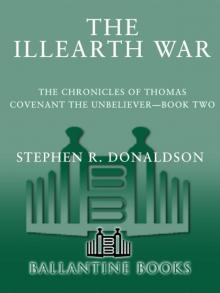 The Illearth War
The Illearth War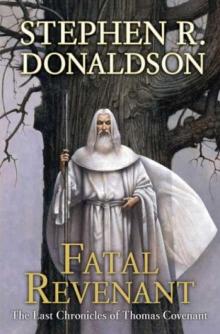 Last Chronicles of Thomas Covenant 02 - Fatal Revenant
Last Chronicles of Thomas Covenant 02 - Fatal Revenant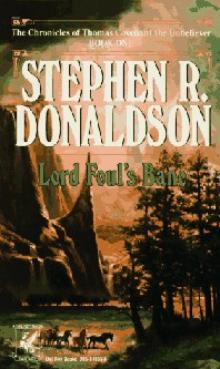 Lord Foul's Bane
Lord Foul's Bane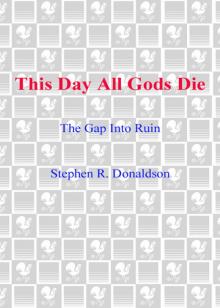 The Gap Into Ruin: This Day All Gods Die
The Gap Into Ruin: This Day All Gods Die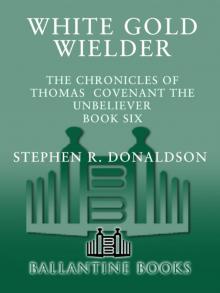 White Gold Wielder
White Gold Wielder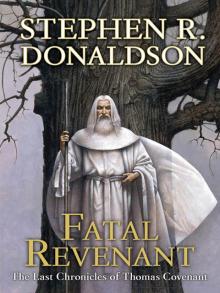 Fatal Revenant
Fatal Revenant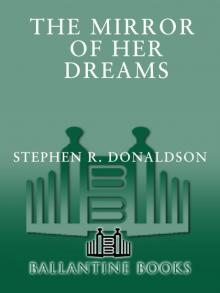 The Mirror of Her Dreams
The Mirror of Her Dreams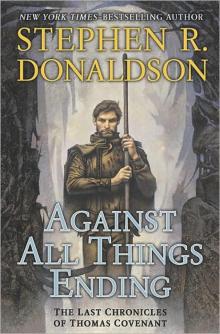 Against All Things Ending
Against All Things Ending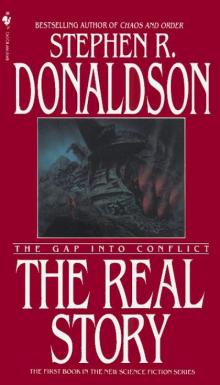 The Real Story: The Gap Into Conflict
The Real Story: The Gap Into Conflict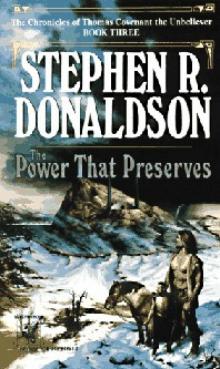 The Power That Preserves
The Power That Preserves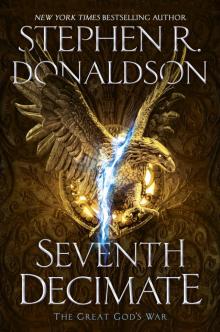 Seventh Decimate
Seventh Decimate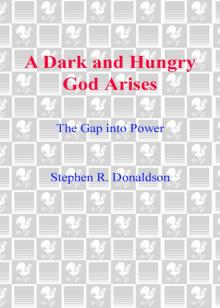 The Gap Into Power: A Dark and Hungry God Arises
The Gap Into Power: A Dark and Hungry God Arises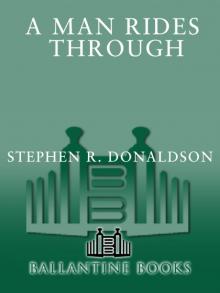 A Man Rides Through
A Man Rides Through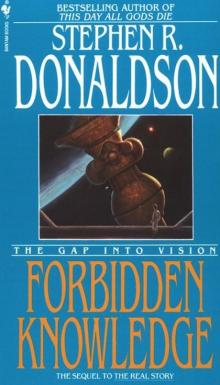 The Gap Into Vision: Forbidden Knowledge
The Gap Into Vision: Forbidden Knowledge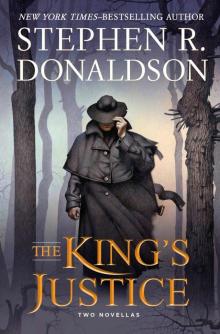 The King's Justice: Two Novellas
The King's Justice: Two Novellas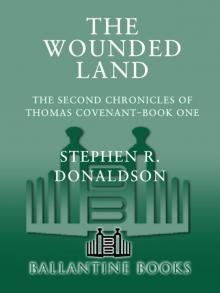 The Wounded Land
The Wounded Land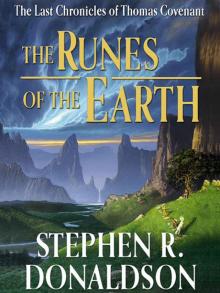 The Runes of the Earth
The Runes of the Earth Mordant's Need
Mordant's Need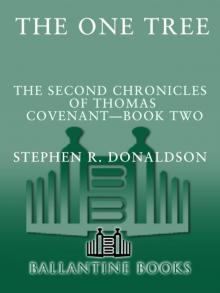 The One Tree
The One Tree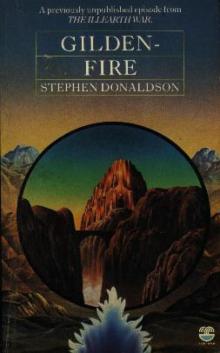 Gilden-Fire
Gilden-Fire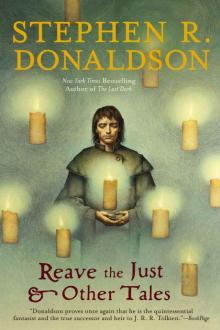 Reave the Just and Other Tales
Reave the Just and Other Tales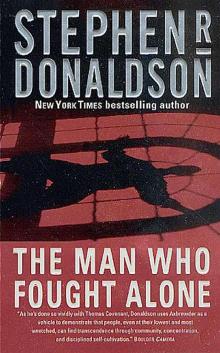 The Man Who Fought Alone
The Man Who Fought Alone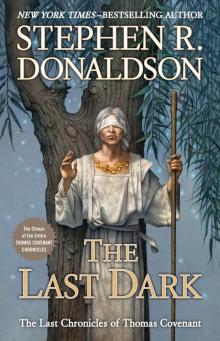 The Last Dark
The Last Dark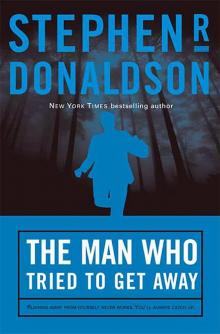 The Man Who Tried to Get Away
The Man Who Tried to Get Away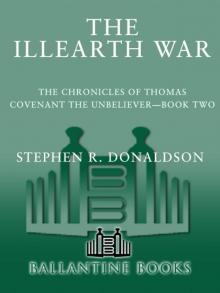 Thomas Covenant 02: The Illearth War
Thomas Covenant 02: The Illearth War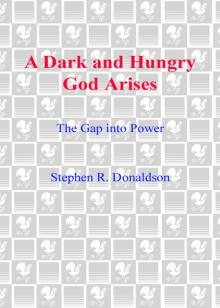 A Dark and Hungry God Arises
A Dark and Hungry God Arises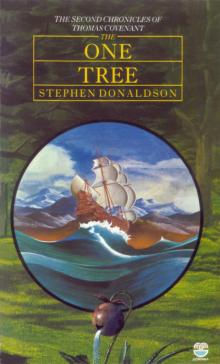 The One Tree t2cotc-2
The One Tree t2cotc-2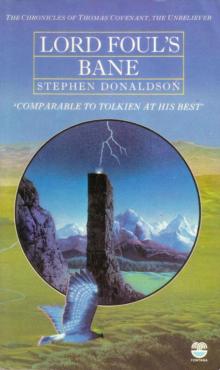 Lord Foul's Bane cotc-1
Lord Foul's Bane cotc-1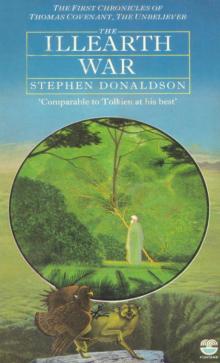 The Illearth War t1cotc-2
The Illearth War t1cotc-2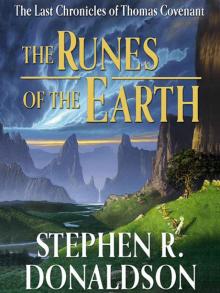 The Runes of the Earth: The Last Chronicles of Thomas Covenant - Book One
The Runes of the Earth: The Last Chronicles of Thomas Covenant - Book One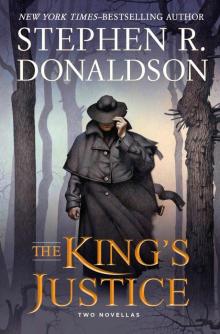 The King's Justice
The King's Justice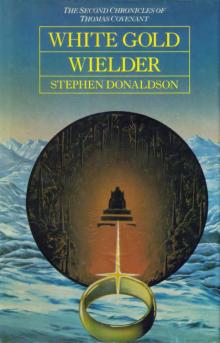 White Gold Wielder t2cotc-3
White Gold Wielder t2cotc-3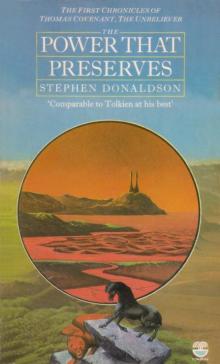 The Power That Preserves t1cotc-3
The Power That Preserves t1cotc-3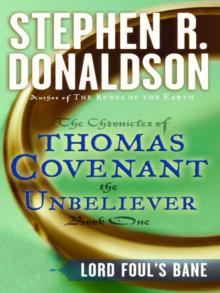 Thomas Covenant 01: Lord Foul's Bane
Thomas Covenant 01: Lord Foul's Bane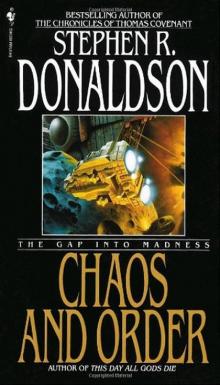 Chaos and Order: The Gap Into Madness
Chaos and Order: The Gap Into Madness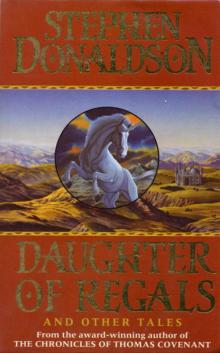 Daughter of Regals
Daughter of Regals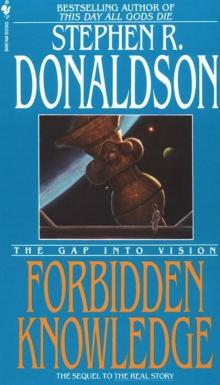 Forbidden Knowledge: The Gap Into Vision
Forbidden Knowledge: The Gap Into Vision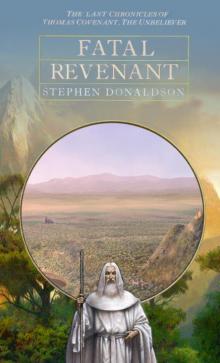 Fatal Revenant t3cotc-2
Fatal Revenant t3cotc-2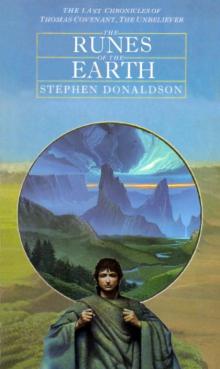 The Runes of the Earth t3cotc-1
The Runes of the Earth t3cotc-1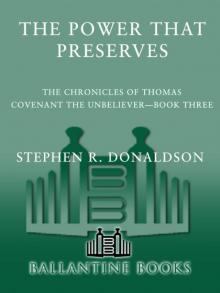 Thomas Covenant 03: Power That Preserves
Thomas Covenant 03: Power That Preserves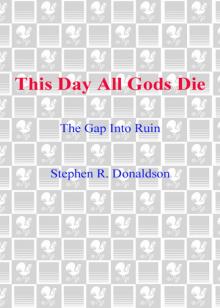 This Day all Gods Die: The Gap into Ruin
This Day all Gods Die: The Gap into Ruin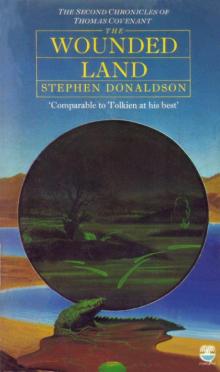 The Wounded Land t2cotc-1
The Wounded Land t2cotc-1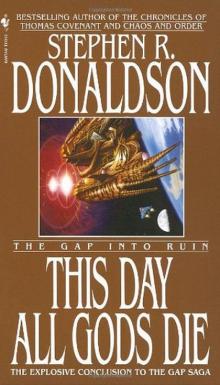 This Day All Gods Die
This Day All Gods Die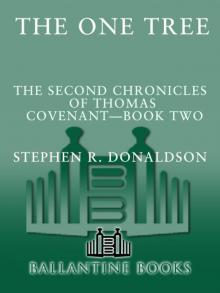 One Tree
One Tree